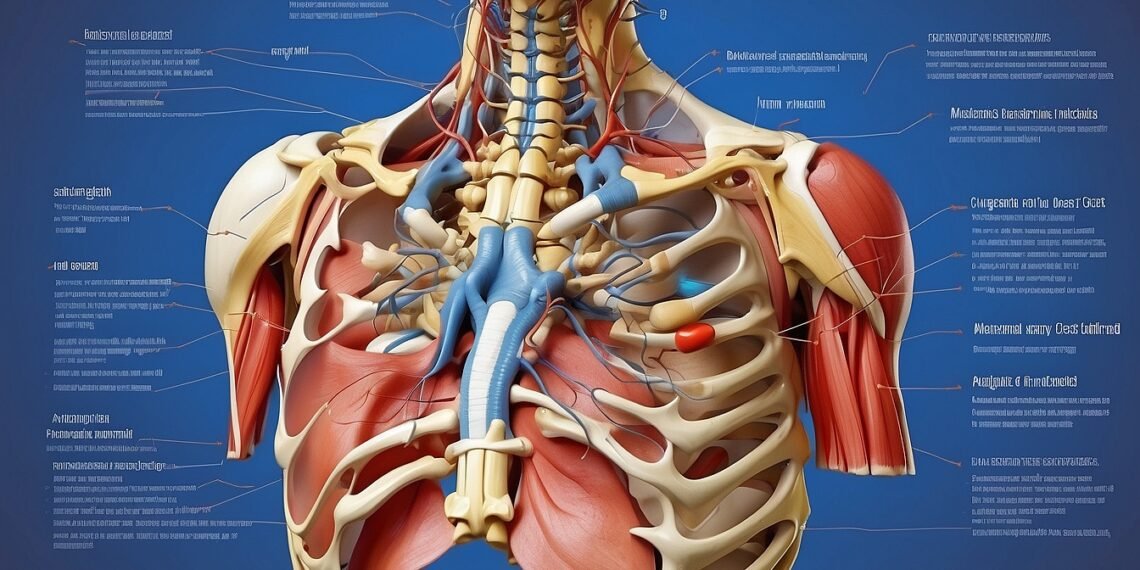Yes, costochondritis can cause back pain, especially in the upper and middle back. The inflammation and pain in the cartilage connecting your ribs to your breastbone can radiate outwards, leading to discomfort in nearby areas. Let’s delve deeper into the mechanisms, potential treatment options, definitions, and when to seek medical attention:
Direct and Indirect Mechanisms:
- Referred pain: The pain from the inflamed cartilage can be referred to other parts of the chest wall, including the upper and middle back, creating discomfort in these areas.
- Muscle tension: The body may compensate for the pain in the chest by tightening muscles in the back, leading to stiffness and additional pain.
- Posture changes: The pain and discomfort from costochondritis can lead to changes in posture to avoid aggravating the chest area, potentially causing pain in the back.
Treatment Options:
- Pain relievers: Over-the-counter medications like ibuprofen and acetaminophen can help manage pain and discomfort.
- Anti-inflammatory medications: Nonsteroidal anti-inflammatory drugs (NSAIDs) can reduce inflammation in the cartilage and alleviate pain.
- Rest: Avoiding activities that aggravate the pain, such as heavy lifting or strenuous exercise, can promote healing.
- Physical therapy: Specific exercises can help strengthen chest muscles and improve flexibility, reducing stress on the costochondral joints.
- Heat therapy: Applying heat packs to the chest area can help relax muscles and reduce pain.
Definitions:
- Costochondritis: Inflammation of the cartilage that connects the ribs to the breastbone (sternum).
- Referred pain: Pain that is felt in an area other than the source of the pain.
- Muscle tension: Involuntary contraction of muscles, often caused by pain or stress.
- Posture: The position of your body when you are standing, sitting, or lying down.
- Anti-inflammatory medications: Medications that reduce inflammation in the body.
When to See a Doctor:
It is important to see a doctor if you experience any of the following:
- Severe or persistent back pain that is not relieved by home treatment
- Back pain that is accompanied by chest pain, shortness of breath, or fever
- Back pain that is getting worse
- Back pain that interferes with your daily activities
- You are concerned about the possibility of other causes of the pain
Additional Resources:
- National Institute of Arthritis and Musculoskeletal and Skin Diseases: https://www.niams.nih.gov/
- Mayo Clinic: https://www.mayoclinic.org/diseases-conditions/costochondritis/multimedia/costochondritis/img-20005633
- American Academy of Family Physicians: https://www.aafp.org/pubs/afp/issues/2009/0915/p617.html
- YouTube video on costochondritis and back pain: https://…
Remember: While costochondritis can cause back pain, it’s important to rule out other potential causes. Consult your doctor to ensure proper diagnosis and receive the most effective treatment plan for your specific situation.
Follow-up Questions about Costochondritis and Back Pain:
Specifics of Pain:
- What type of back pain do you experience (e.g., sharp, dull ache, burning)?
- Where in your back do you feel the pain (e.g., upper back, middle back, both sides)?
- Does the back pain come and go, or is it constant?
- Does the back pain radiate anywhere else (e.g., chest, arms)?
- Does the back pain worsen with specific movements or activities (e.g., bending over, taking deep breaths)?
- What makes the back pain feel better or worse?
Relationships:
- Does the back pain interfere with your daily activities, work, or hobbies?
- Has the back pain affected your sleep or mood?
- Has the back pain strained your relationships with family or friends?
- Have you discussed your concerns about the back pain with your partner or loved ones?
- Have you found support groups or online communities helpful in dealing with the pain and discomfort?
Treatment and Management:
- Are you currently taking any medications or using any treatments for the back pain or costochondritis?
- Have you tried any other treatment options, such as heat therapy, physical therapy, or rest, to alleviate the pain?
- How effective have the treatments been in relieving the back pain?
- Are you experiencing any side effects from the medications or treatments?
- Have you considered alternative or complementary therapies to manage the pain?
Other Potential Causes:
- Have you been diagnosed with any other medical conditions that could contribute to back pain (e.g., muscle strain, arthritis)?
- Have you recently experienced any injuries or falls?
- Do you have any other symptoms besides back pain that could be related to costochondritis or another medical condition (e.g., chest pain, shortness of breath, fever)?
- Have you discussed the possibility of other causes of the back pain with your doctor?
- Have you had any tests or examinations done to investigate the cause of the back pain?
Remember: These are just some examples of follow-up questions that people might ask about costochondritis and back pain. The specific questions you ask will vary depending on your individual situation and concerns.

